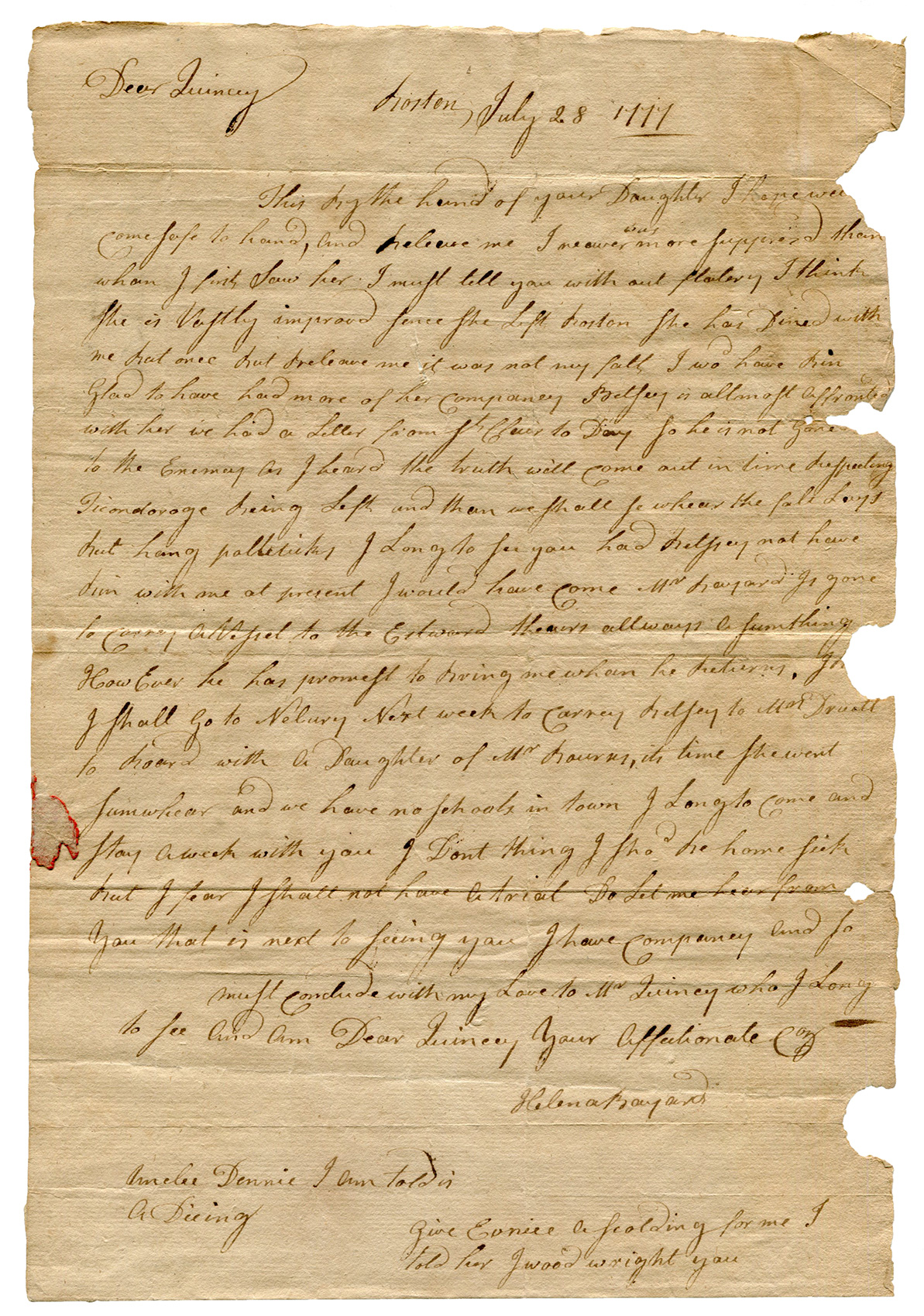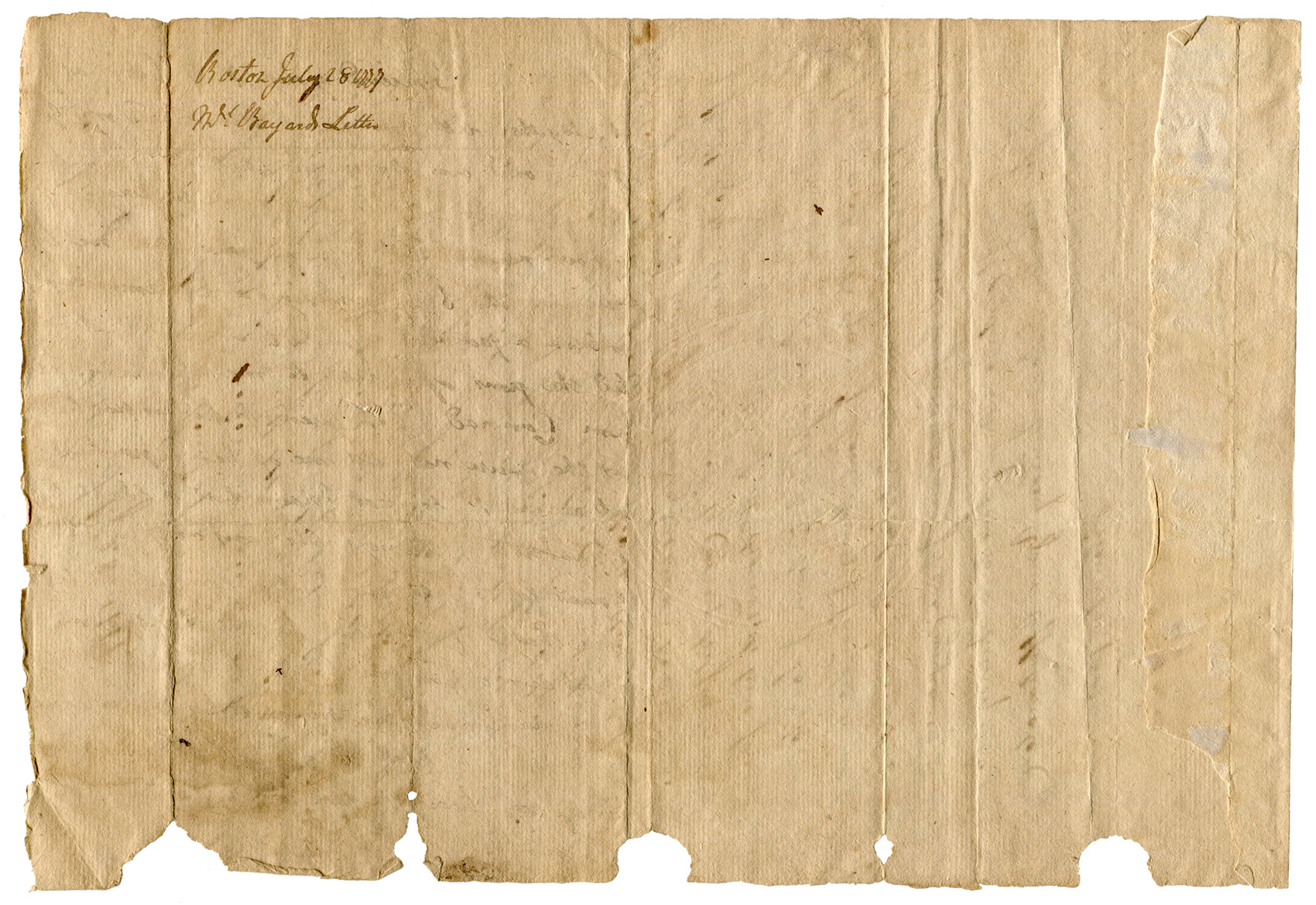 (Arthur St. CLAIR) Helen BAYARD Autograph Letter Signed, “Helen Bayard“, 1 page, 285 x 192 mm. (11 1/4 x 7 1/2 in.) Boston, 18 July 1777, to her cousin, “Quincy” concerning a variety of family news, including the receipt of a letter from her cousin, General Arthur St. Clair, which she hoped would dispel rumors that he had defected to the British after he evacuated Fort Ticonderoga on July 5, 1777.
(Arthur St. CLAIR) Helen BAYARD Autograph Letter Signed, “Helen Bayard“, 1 page, 285 x 192 mm. (11 1/4 x 7 1/2 in.) Boston, 18 July 1777, to her cousin, “Quincy” concerning a variety of family news, including the receipt of a letter from her cousin, General Arthur St. Clair, which she hoped would dispel rumors that he had defected to the British after he evacuated Fort Ticonderoga on July 5, 1777.
Bayard writes, in full [with period spellings retained with minimal comment]: “This By the hand of your Daughter I hope will come safe to hand, and believe me I never was more supprised than when I first saw her. I must tell you with out flat[t]ery I think She is Vastly improved since she Left Boston She has Dined with me but once But Believe me it was not my fa[u]lt I wo[‘]d have Bin Glad to have had more of her Companey Betsey is allmost Affronted with her we had Letter from St Clair to Day so he is not gone to the Enemey As I heared the truth will come out in time Respecting Ticonderoga Beong Left and than we shall se whear the falt Lays But hang pollitics I Long to see you had Betsey not have him with me at present I would have come Mr Bayard Is gone to Carry a vessel to the Eastward there were allways a sumthing How Ever he has promest to Bring me whan he Returns.. I shall Go to Ne[w]bury[?] next week to Carrey Betsey to Mr Druatt to B[o]ard with a Daughter of Mr Baurus, in time she went sumwhear and we have no schools in town I Long to come and stay a week with you I Don’t thing I sho[‘]d be home sick But I fear I shall not have a trial Do Let me hear from you that is next to seeing you I have Companey and so must conclude with my Love to Mr Quncy who I Long to see and am Dear Quincey Your Affectionate Coz—” In a pair of postscripts, she adds, “Unclee Dennie I am told is A Dieing” and “Give Eunice A scolding for me I told her I wood wright you“.
When threatened with encirclement by Burgoyne’s forces, St. Clair wisely abandoned his indefensible position at Fort Ticonderoga, saving a large body of troops for future engagements that would ultimately result in a spectacular victory at Saratoga. For a lack of space in the boats used in the Fort’s evacuation, St. Clair was compelled to abandon several large pieces of cannon and a good deal of other supplies, leading to suspicion that the Scottish-born former British officer had defected to the enemy. Although his appearance at Fort Edward would seem to dispel this rumor, both he and General Philip Schuyler, in command of the Northern Department, were the subject of rumors that they had accepted bribes from the British in exchange for the retreat.
 Congress greeted news of Ticonderoga’s fall with anger and dismay, ordering St. Clair be removed from command. John Adams and his allies moved to remove Schuyler as well, replacing him with New Englander Horatio Gates. St. Clair demanded a court-martial, which completely exonerated him of wrongdoing — but the political damage had been done: Ticonderoga would prove to be his final field command of the war.
Congress greeted news of Ticonderoga’s fall with anger and dismay, ordering St. Clair be removed from command. John Adams and his allies moved to remove Schuyler as well, replacing him with New Englander Horatio Gates. St. Clair demanded a court-martial, which completely exonerated him of wrongdoing — but the political damage had been done: Ticonderoga would prove to be his final field command of the war.
Helen Bayard was the sister of St. Clair’s wife, Phoebe Bayard, and daughter of Mary Bowdoin Bayard, the sister of the prominent James Bowdoin (1726-1790), who would later serve as the second governor of an independent Massachusetts. St. Clair wed Phoebe in 1760, only three years after his arrival in North America as a British officer serving at the siege of Louisbourg and the capture Quebec under General Wolfe. In the early 1760s, St. Clair resigned his commission and the couple migrated to western Pennsylvania. There, St. Clair established himself as a prominent land owner and pubic official.
Edge wear with chipping to right margin affecting content, even toning, creasing, light soiling, usual folds, overall very good condition.
(EXA 5893) $1,650
